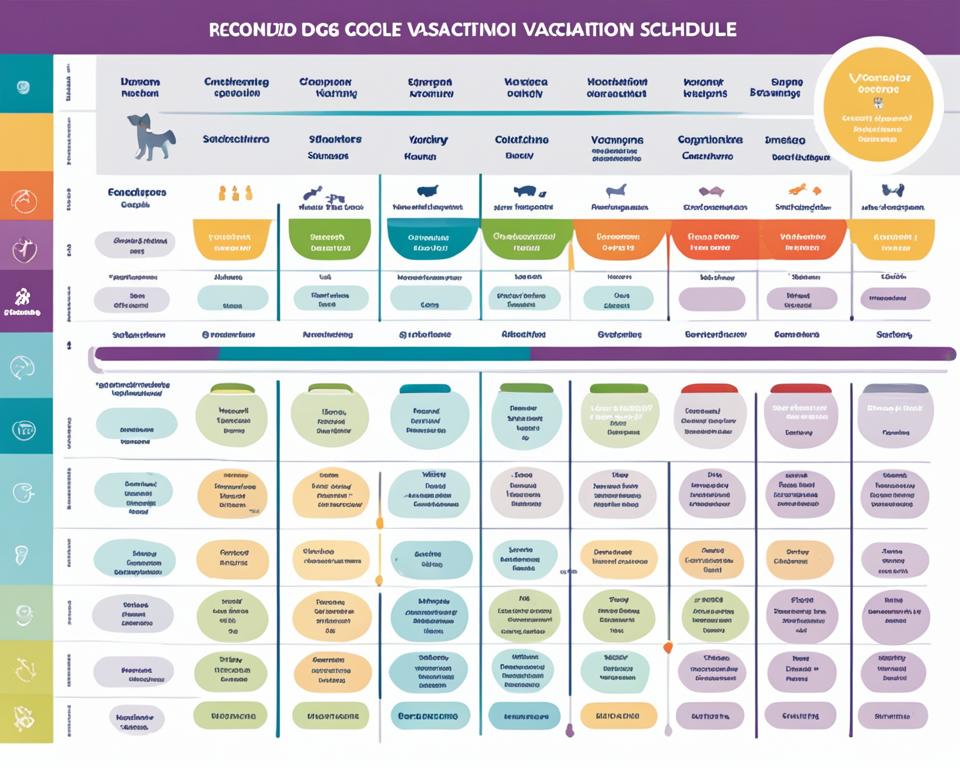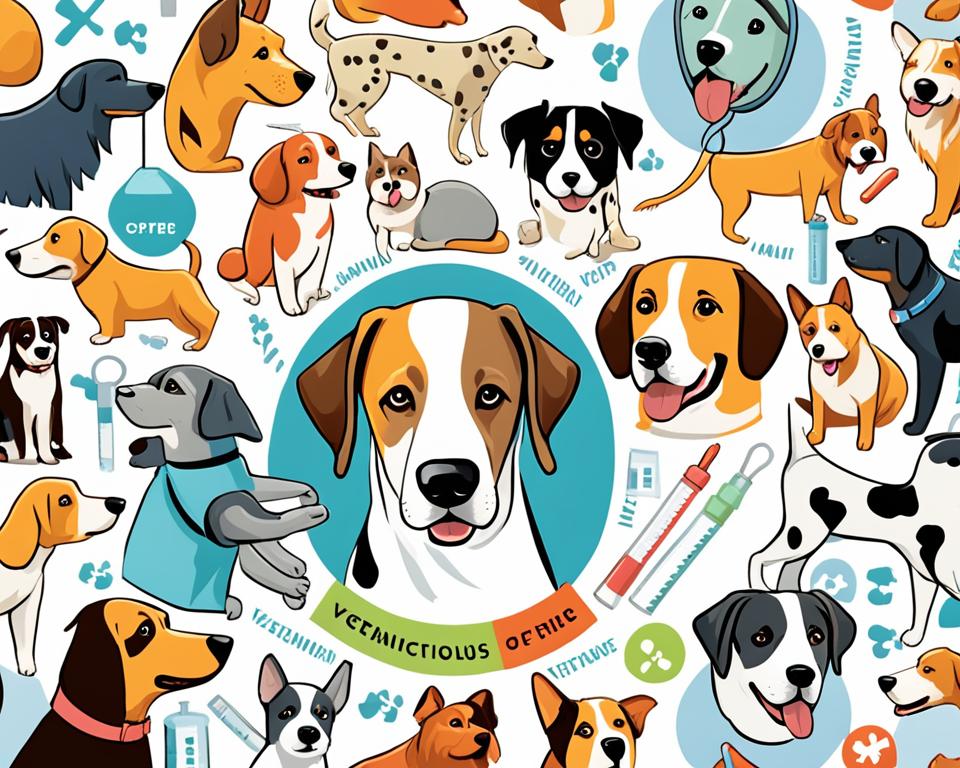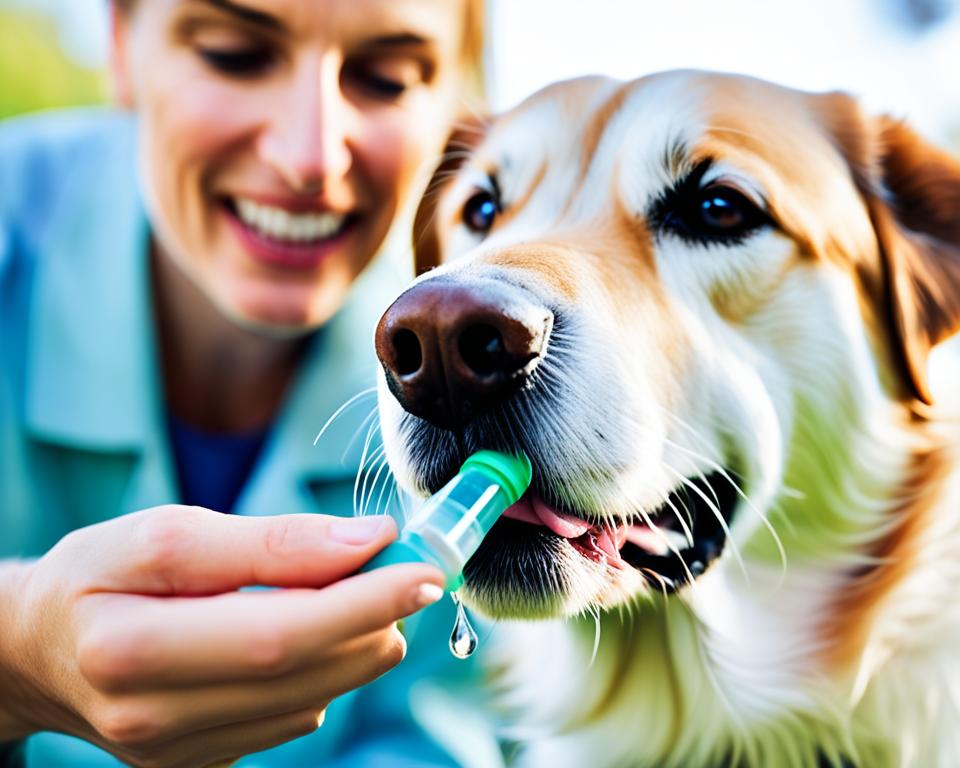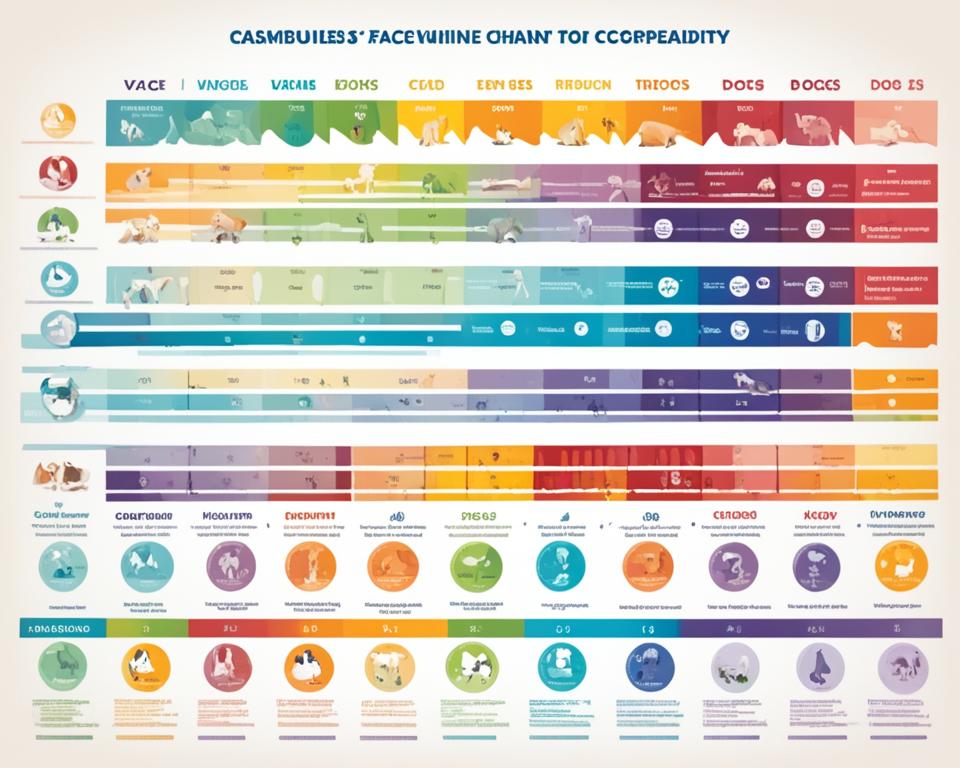As a dog owner, I know keeping our furry friends healthy is key. That’s why I’m excited to share this guide on dog vaccination schedules. It’s important for both new puppy parents and those with adult dogs to know about canine immunizations.
Puppy shots start early, at 6 weeks old, and go on throughout their life. The schedule includes core vaccines like distemper, parvovirus, and rabies. These vaccines protect against serious diseases that can harm our pups.
The average cost of puppy vaccinations is about $75-100. This covers core vaccines given at 6, 12, and 16 weeks. It’s a small price for peace of mind and a healthy, happy pup!
Let’s explore dog vaccinations together. I’ll guide you on what you need to know to keep your four-legged friend safe and healthy.
Understanding the Importance of Dog Vaccinations
Dog vaccinations are very important for your pet’s health. They keep your dog safe from serious diseases. They also help keep everyone safe.
Protecting Your Pup from Preventable Diseases
Recommended dog vaccines protect against deadly illnesses. Canine parvovirus can be deadly in just 48 to 72 hours. That’s why it’s key to keep your dog’s shots up to date.

Building Immunity Through Vaccinations
Vaccines introduce small parts of diseases to your dog’s immune system. This helps your dog build immunity without getting sick. Puppies start their vaccine series at 6 to 8 weeks old, with more shots later.
The Role of Vaccines in Public Health
Vaccines do more than protect your dog. They help keep everyone safe. For example, rabies kills about 59,000 people a year in some countries. Vaccinated dogs stop the spread of these diseases.
| Core Vaccines | Non-Core Vaccines |
|---|---|
| Canine Parvovirus | Bordetella |
| Canine Distemper | Canine Influenza |
| Hepatitis | Leptospirosis |
| Rabies | Lyme Disease |
It’s important to have a vaccine plan for your dog. Always talk to a vet to find the best plan for your dog. With the right shots, your dog can stay healthy and safe, helping everyone around them too.
Core Vaccines Every Dog Needs
As a dog owner, I know it’s key to keep our pets safe from harmful diseases. That’s why I make sure my pup gets the core dog vaccinations vets recommend. These shots are vital for keeping dogs healthy and safe.
Rabies Vaccine: A Legal Requirement
The rabies vaccine is a must for all dogs. It’s not just smart, it’s the law in many places. This shot fights a deadly virus that can hit both animals and people. I always keep my dog’s rabies vaccine current to keep them safe and follow the law.
DHPPi: The Combination Vaccine
The DHPPi vaccine is a strong shot that fights many diseases. It shields dogs from distemper, hepatitis, parvovirus, and parainfluenza. I like that this vaccine covers so many illnesses, keeping my dog safe from several serious threats.

Leptospirosis: A Crucial Protection
The leptospirosis vaccine is key in many places, even if it’s not always needed. This bacterial disease can be risky for dogs and people. I talk with my vet to see if this vaccine is right for my dog, based on our life and where we live.
Remember, these core vaccines are given in a series to puppies, with boosters for adults every 1-3 years. It’s smart to work with your vet to find the best vaccination plan for your furry friend.
| Vaccine | Protects Against | Frequency |
|---|---|---|
| Rabies | Rabies virus | Every 1-3 years |
| DHPPi | Distemper, Hepatitis, Parvovirus, Parainfluenza | Every 1-3 years |
| Leptospirosis | Leptospira bacteria | Annually |
Dog Vaccination Schedule: From Puppyhood to Adulthood
I’ve been a vet for over 16 years. I know how important a good puppy vaccination schedule is. Vaccines keep our pets safe from diseases from the start, at 6 weeks old.
Puppies get their first shots between 6-8 weeks. They need more shots every 3-4 weeks until they’re 16 weeks old. They usually get core vaccines like the combo DAP2PP (distemper, adenovirus, parvovirus, and parainfluenza) and rabies.
Adult dogs need vaccines too, but not as often. Core vaccines are given every 1-3 years, based on the vaccine and your dog’s needs. Booster shots keep your pet immune throughout their life.
| Age | Core Vaccines | Non-Core Vaccines |
|---|---|---|
| 6-8 weeks | DAP2PP | Bordetella |
| 10-12 weeks | DAP2PP | Leptospirosis, Lyme |
| 14-16 weeks | DAP2PP, Rabies | Canine Influenza |
| Adult (Annual) | Rabies booster | As needed |
Your vet will make a schedule just for your dog, based on their life and risks. Vaccine costs are between $20 to $85 per shot. It’s a small price for your dog’s health and happiness.
Non-Core Vaccines: Tailoring Protection to Your Dog’s Lifestyle
Non-core dog vaccinations are key to keeping our pets safe. They protect against specific risks based on your dog’s life, where they live, and who they meet.
Bordetella: The Kennel Cough Vaccine
The Bordetella vaccine is a must for social dogs. It keeps them safe from kennel cough, a common and contagious respiratory infection. This is important for dogs that go to dog parks, stay in kennels, or get groomed.

Lyme Disease Vaccine: For Dogs in High-Risk Areas
If you live where ticks are common, your dog might need the Lyme disease vaccine. It’s great for dogs that love to play outside in wooded areas. This vaccine fights Lyme disease, spread by ticks.
Canine Influenza: Protecting Against Dog Flu
The canine influenza vaccine helps fight dog flu, a fast-spreading respiratory illness. It’s a good idea for dogs that meet other dogs often or live where dog flu has been reported.
Talking to your vet is important when deciding on these vaccines. They can make a plan that fits your dog’s needs and risks. Keeping up with check-ups and booster shots is also crucial for your dog’s health.
| Vaccine | Recommended For | Protects Against |
|---|---|---|
| Bordetella | Social dogs, frequent boarders | Kennel cough |
| Lyme Disease | Dogs in tick-prevalent areas | Lyme disease |
| Canine Influenza | Dogs in social settings, outbreak areas | Dog flu |
Maintaining Immunity: Boosters and Titers for Adult Dogs
As your furry friend gets older, it’s important to keep their immune system strong. Adult dog shots are key in this effort. These shots help protect against many diseases and are given at certain times. Some dogs need shots every year, while others need them every three years.
Titer tests are another way to check on your dog’s immunity. They measure the antibodies your dog has for certain diseases. If the levels are high, you might not need as many shots. But, remember, rabies shots are always needed by law.
It’s important to work with your vet to make a vaccination plan for your adult dog. They look at your dog’s age, health, and lifestyle to suggest the best shots or tests. By keeping up with shots, you’re not just protecting your dog. You’re also keeping other dogs safe in your community.

